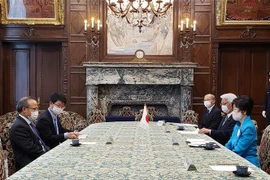 Health workers wearing protective suits collect blood samples at a makeshift rapid testing center (Photo: AFP)
Health workers wearing protective suits collect blood samples at a makeshift rapid testing center (Photo: AFP)Beijing (VNA) – That Vietnam hasbeen one of the best countries in the world at handling the COVID-19 pandemic isnot an exaggeration, wrote a recent article published by Asia Times, an Englishlanguage news media publishing group.
“In late July when the second wave of thedisease hit Vietnam, many held their breath waiting to see how the countrywould handle the return of the virus. Within three months, Vietnam has againsuccessfully flattened the curve of COVID-19 infections,” the article noted.
While many countries are still strugglingto control the rise of cases, Vietnam has been able to bounce back from thecrisis, it continued.
Vietnam’s success story has been attributedto effective closures and lockdowns, high levels of masking, prompt contacttracing and clear risk communication to the public. These measures have beenmade possible because of high public trust in the Communist Party of Vietnam(CPV).
“The public still trusts the CPV to takecare of its citizens and to lead the country out of crises when they occur,” itaffirmed.
Asian Barometer survey data collected priorto the COVID-19 outbreak suggest that Vietnamese citizens, on average, trust awide range of formal institutions such as the Party, the Government, themilitary, the Party General Secretary and State President, the NationalAssembly and the police.
High public trust in the regime haspresented a favourable environment for the CPV to handle COVID-19. Socialcompliance, especially when it comes to coping with economic losses, socialdistancing, masking and sheltering, has been highly maintained in the fightagainst the virus.
One answer for the high public trust mightbe the vivid memories about how the CPV led the country out of poverty, and theperception that the party has made enormous attempts to resolve the country’sproblems.
The author stated that it is undeniablethat the CPV has earned public trust from consistently high economic growthover the last decades.
However, what matters to the public is notonly impressive numbers, but also the fact that Vietnam has emerged from beingone of the poorest countries in the world to becoming an attractive investmentdestination in the global economy.
Lifting the country out of poverty provedthe CPV’s capacity to lead its citizens out of crises, especially among thegenerations that lived through the transition process.
The CPV’s willingness to correct pastmistakes may have built greater public trust, the article said.
Furthermore, the Party also did well in twoother crises, namely the Asian financial crisis in 1997 and the severe acuterespiratory syndrome (SARS) outbreak, which further increased public trust inits capacity to lead in times of difficulty.
The author went on to note that the publicmay perceive that the CPV does care about the well-being of its citizens. Thispoint is illustrated by the fact that the party has attempted to solve problemsthat it publicly acknowledges.
Many domestic issues are open for public discussionand state media report issues related to corruption, the environment,education, economics and foreign affairs. These issues are even open fortelevised public legislative debates.
In addition to allowing public debate oncertain issues, some may perceive that the CPV is attempting to resolve theseproblems, such as corruption, according to the article.
Since 2016, the CPV has implemented a large-scaleanti-corruption campaign.
Moreover, it is evident that the party hasmade considerable efforts to improve governance and policy coordination betweenthe central and local governments, which has led to steady improvements in manyareas such as health care and tackling corruption.
The author concluded that high public trustin the CPV prior to COVID-19 afforded it an opportunity to tackle the pandemiceffectively./.



























